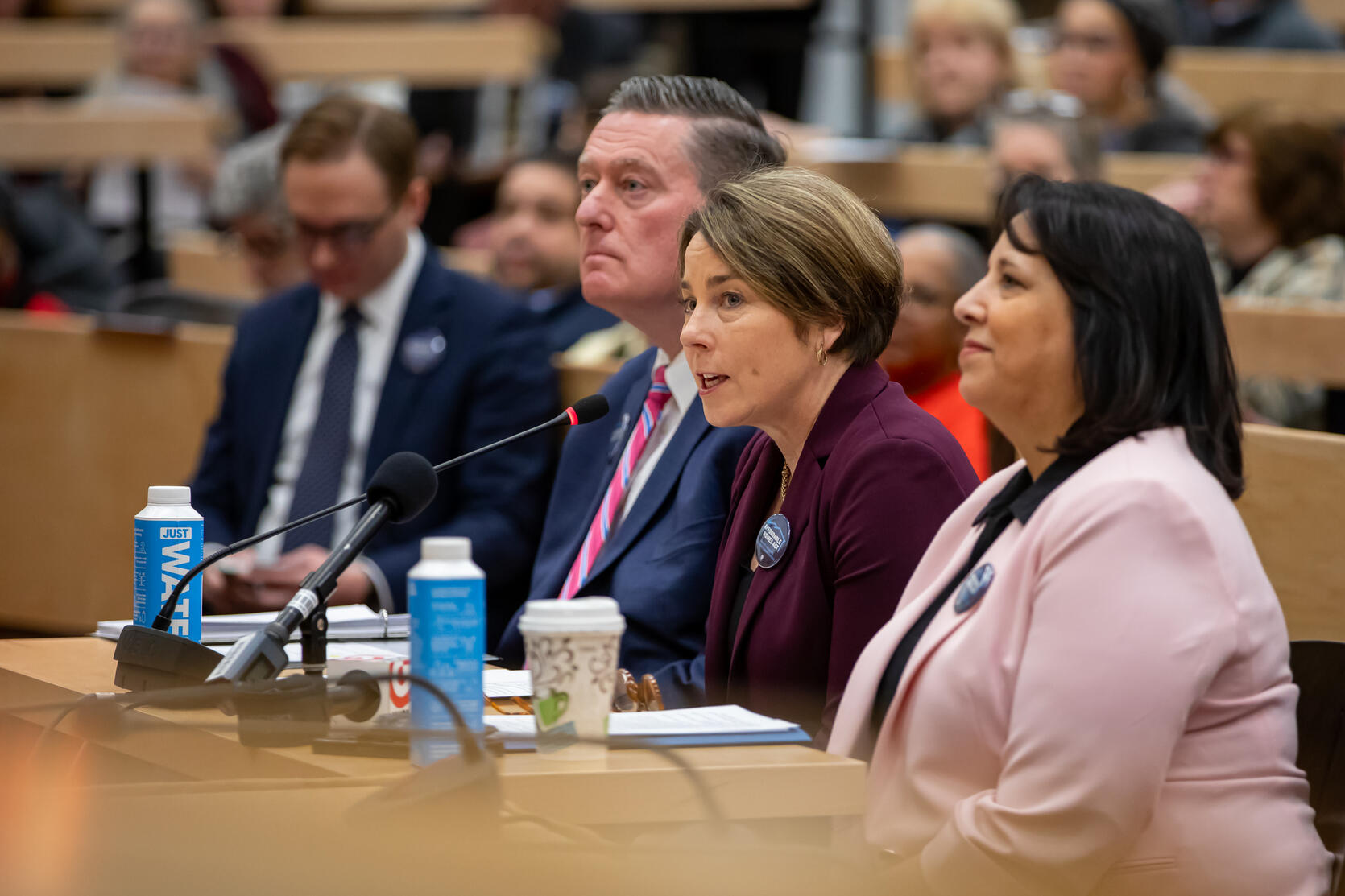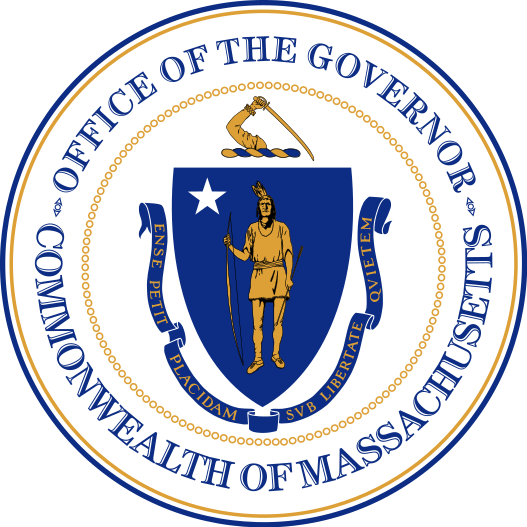- Governor Maura Healey and Lt. Governor Kim Driscoll
- Executive Office of Housing and Livable Communities
Media Contact
Karissa Hand, Press Secretary

Boston — Today, Governor Maura Healey, Lt. Governor Kim Driscoll and Secretary of Housing and Livable Communities Ed Augustus testified in support of H. 4138, the Affordable Homes Act, before the Joint Committee on Housing.
The Affordable Homes Act is the cornerstone of the governor’s housing policy. The $4.13 billion in spending authorizations and 28 policy changes offer a comprehensive roadmap to grow the state’s housing supply and make it easier for people to find affordable places to live.
A forthcoming analysis from the UMass Donahue Institute will show that over the next 5 years, the Affordable Homes Act – combined with the tax cuts package signed by Governor Healey last year – will create nearly 30,000 jobs, produce $25 billion in economic impact and bring in $800 million in tax revenue.
“Everywhere we go, Lieutenant Governor Driscoll and I hear from families, seniors, recent graduates, workers, and businesses alike that they are being held back by the high cost of housing in our state,” said Governor Maura Healey. “That’s why we’re going big by proposing the most ambitious housing bill in state history. The Affordable Homes Act will make it easier for people of all income levels to find affordable places to live in Massachusetts, create good jobs and grow our economy.”
The Affordable Homes Act, in combination with recently reauthorized housing tax credits, will fund or enable the creation of more than 40,000 homes that would not otherwise be built. It will also preserve, rehab, support or improve more than 27,000 existing homes.
The legislation also invests $1.6 billion to repair, rehab and modernize the state’s public housing while increasing funding to several programs that support first-time homebuyers and the building of affordable housing.
In addition to spending authorizations, the Affordable Homes Act would enact strategic policy changes such as authorizing accessory dwelling units under 900 square feet by right, creating a seasonal communities designation and allowing cities and towns to enact a real estate transfer fee on sales over $1 million. That money would go to the community to support the development and preservation of affordable housing.
“As the Mayor of Salem, I saw firsthand the critical role that housing plays in supporting our local economies. People and businesses can’t stay in the communities they love if they can’t afford it,” said Lt. Governor Kim Driscoll. “The Affordable Homes Act will help us create the housing environment that we want and need for Massachusetts, unlocking our competitiveness and improving quality of life for all.”
Homeowners, public housing tenants, local business owners and chambers of commerce were scheduled to testify in support of the bill today.
“The unconventional alliances that have come forward to support this historic plan underscores just how great the need is,” said Housing and Livable Communities Secretary Ed Augustus. “It is rare to have this breadth and depth of support. The fact that everyone from public housing advocates to employers, business leaders and health care professionals demonstrates the urgent need for the Affordable Homes Act and the broad coalition that supports it.”
Statements of Support
Phil Jones, Co-Lead, Greater Boston Interfaith Organization’s Housing Justice Campaign:
“The Affordable Homes Act has the potential to make history. Massachusetts could begin to reverse decades of under-investment from state owned public housing, and give communities powerful new tools, such as the real estate transfer fee, to create and preserve affordable homes. The Commonwealth needs this!”
Sarah Byrnes, Executive Director, Mass Union of Public Housing Tenants:
“The Mass Union of Public Housing Tenants applauds the Healey Administration’s significant investment in public housing in the Affordable Homes Act. Many of our members in state public housing live in deplorable conditions that simply must be fixed. We urge the legislature to seize this historic opportunity to address decades of negligence and underfunding so that the residents can live with safety and dignity.”
Chrystal Kornegay, CEO, MassHousing:
“The Governor’s Affordable Homes Act supercharges tried and true programs like investing in public housing, while also delivering new approaches to confronting the Commonwealth’s housing challenges. Its investments in new homeownership and rental housing opportunities will make more housing affordable to more families – all while advancing our ambitious climate goals.”
Adam Chapdelaine, Executive Director, Massachusetts Municipal Association:
"The MMA applauds Governor Healey's bold and robust proposal, the Affordable Homes Act. Massachusetts cities and towns deeply appreciate the critical funding and policies proposed that would support local housing initiatives and empower communities as vital partners in this effort.”
Timothy Murray, President & CEO, Worcester Regional Chamber of Commerce:
“The housing bond bill represents a transformational investment in housing for the entire Commonwealth, including Central Massachusetts, where our fast-growing population and economy is challenged by one of the lowest rental housing vacancy rates in the country and rising home prices. The Healey-Driscoll administration’s policy and spending proposals, crafted under the leadership of Secretary Ed Augustus, are both innovative and desperately needed in Gateway Cities like Worcester to increase housing production and homeownership opportunities so everyone can afford to comfortably live, work, and play in the Commonwealth.
Cindy Rowe, President and CEO, Jewish Alliance for Law and Social Action:
“Upholding human dignity is a fundamental Jewish value, which we can only fulfill by ensuring that there is housing for all. It is our moral obligation to make housing accessible, affordable, safe, and healthy for everyone. The upcoming housing bond bill provides a critically important opportunity to address key priorities in the areas of housing affordability, housing justice, and climate justice. Passing it will allow us to have a state which is both competitive and compassionate and treat our neighbors with dignity and respect.”
Bob Giannino, President and CEO, United Way of Massachusetts Bay:
“A safe, stable place to live supports our ability to thrive in school or work and is a foundation on which shared prosperity is built. Furthermore, housing instability and homelessness is systemically expensive, fueling higher costs for emergency response, education, and healthcare. The Affordable Homes Act is a comprehensive proposal that rises to the complex and pervasive challenge that housing instability presents for our Commonwealth.”
Emily Haber, President & CEO of the MA Assoc. of Community Development Corporations:
"MACDC is proud to stand in support of the Affordable Homes Act. The bill rises to meet a crucial moment, and its impact will ripple through generations of Bay Staters, from the Berkshires to the Cape, and everywhere in between. Our communities need this bill's funding and its crucial policy improvements, and they need them now.”
Jesse Kanson-Benanav, Executive Director of Abundant Housing Massachusetts:
"I applaud the Healey-Driscoll Administration for taking the necessary steps to address the housing shortage that is driving home prices in Massachusetts to record levels with the introduction of the Affordable Homes Act. Along with a historic $4.1 billion financial investment in our state’s future, the Affordable Homes Act will create thousands of new affordable homes by legalizing accessory dwelling units (ADUs) as-of-right statewide. I look forward to working with the legislature and the Administration to pass the Affordable Homes Act this session.”
Paul Niedzwiecki, CEO, Cape Cod Chamber of Commerce:
“The Cape Cod Chamber of Commerce commends the Healey-Driscoll Administration’s efforts to improve livability and competitiveness in the Commonwealth through the landmark Affordable Homes Act (H.4138). The high cost and low availability of housing impacts each region of our state differently. This comprehensive legislation demonstrates a recognition that housing solutions cannot be achieved through a one-size-fits-all approach. We broadly support the policy proposals and capital investments outlined in this bill and look forward to engaging with the administration and legislature moving forward.”
Jay Ash, CEO of the Massachusetts Competitive Partnership and Former Massachusetts Secretary of Housing and Economic Development:
“The housing crisis we face in Massachusetts poses a significant and immediate threat to the stability of our economy. Without an increase in available supply of all types of housing, including both affordable and workforce, families cannot afford to stay here and workers from other states cannot afford to move here. Employers across the state will remain unable to retain a workforce to support their current needs while the high cost of living will also remain an obstacle in attracting new business to the Commonwealth. Business leaders continue to discuss the lack of housing production having a majorly negative impact on the state’s economic competitiveness and applaud the Healey-Driscoll Administrations effort to drive production through the historic level of investment within the Affordable Homes Act. We urge the legislature to move quickly to pass this landmark legislation.”
JD Chesloff, President & CEO, Massachusetts Business Roundtable:
“Massachusetts’ talent advantage is being threatened by the state’s high cost of living and doing business, which contribute to a troubling out-migration of talent, making it difficult for employers to fill open jobs. For an economy historically based on access to the best talent in the world, this is a direct threat to the state’s competitiveness. One of the key drivers of cost is housing, and it is imperative that significant housing legislation be passed this session. The Affordable Homes Act is a good place to start and includes bold and thoughtful ideas designed to address this crisis head on.”
Clark Ziegler, Executive Director, Massachusetts Housing Partnership:
“The Affordable Homes Act is a bold proposal that meets the moment. The past few years have brought enormous challenges including an ongoing pandemic, rapidly changing economic conditions, worsening inequality, and growing sociopolitical risks. But the past few years have also brought innovation and a renewed focus on the role of housing and community in our lives. There is a growing awareness of how housing intersects with many other issues we care about, including racial equity, economic justice, transportation policy and climate change. The Commonwealth’s future depends on our ability to ensure housing opportunity for all our residents. The Affordable Homes Act responds to these realities with the scale of funding and breadth of policies needed to have a lasting impact.”
Rachel Heller, CEO, Citizens’ Housing and Planning Association (CHAPA):
"The Affordable Homes Act provides the funding and policies to be intentional about affordability, equity, and choice so that we can grow our affordable housing supply as we grow our overall housing supply. This bill will create and preserve affordable and supportive housing; increase the supply of homeownership opportunities; invest in the preservation, decarbonization, and redevelopment of public housing; increase accessibility for people with disabilities, increase housing diversity to meet our diverse needs; support long term housing stability with eviction record sealing; and expand housing choice through the creation of a State Office of Fair Housing.”
Dr. Megan Sandel, Director of Boston Medical Center's Place-Based Investing Initiatives:
“As a pediatrician at Boston Medical Center (BMC), I see the connection between stable, safe housing and the health of our patients on a daily basis,” said Megan Sandel, MD, co-director of BMC’s Grow Clinic and a national researcher on health and housing. “I applaud the Healey-Driscoll Administration for proposing significant new investments in affordable and supportive housing. Addressing homelessness and housing insecurity is a critical way to improve both community and patient level health.”
Roger Herzog, Executive Director, Community Economic Development Assistance Corporation (CEDAC):
“This bold legislation will enable the financing and production of much-needed affordable housing through measures such as capital authorizations for essential housing programs, new zoning and funding resources, and a renewed focus on equity issues through the creation of an Office for Fair Housing. CEDAC strongly supports the passage of this historic bill and looks forward to working closely with the Healey Administration to address the urgent housing needs of the Commonwealth’s most vulnerable populations.”
###
